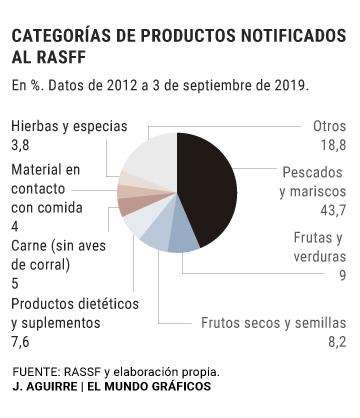- Listeria.Magrudis knew that his products were contaminated by listeria since February
- Analysis: Why do listeria alerts accumulate in Andalusia?
Rare is the day that the European system of food safety alerts (RASFF) does not receive a notification warning of breaches in the matter discovered, among other routes, following a border inspection, the warning by a company or directly due to poisoning, as happened in the case of the meat 'La Mechá', of the Magrudis company, which later Abc revealed that its products had already tested positive for listeria in February.
Spain is the country of the European Union whose products are most often listed as the origin of these alerts, information or border rejections that are transmitted to the RASFF system. Since 2012, with Law 17/2011 on food safety and nutrition in force, until September 2019, RASFF has received 23,510 notifications related to food for human consumption or products in contact with food: about 8 per day , on average .
In a total of 1,273, Spain was the country of origin of the product in poor condition or that did not comply with European regulations. Above are only the extra-community China (2,809 notifications), Turkey (2,117) and India (1,606), according to the analysis of The World from the information extracted from the RASFF database.
On the other hand, from the Ministry of Health, Consumption and Social Welfare they have not offered explanations about the facts: they indicate that they only collect alerts with origin or destination in Spain. However, the RASFF database is public and already in a 2017 report by the Spanish Agency for Food Safety and Nutrition (AESAN) it was recognized that ours was the country of origin with the most notifications in Europe.
According to Commission regulation 16/2011, which establishes the current European "rapid alert" system, members of this network are obliged to report notifications of alerts, monitoring, information or border rejection within their jurisdiction. They must also ensure effective communication of the network, available 24 hours every day of the year.
It must be taken into account, however, that Spain is the main producer of fruits, vegetables and fish in the EU, as well as being one of the main producers of meat, following Eurostat data. Given this higher production, the probability of being the origin of a problem is higher.
The origin of the warning of the current listeria outbreak in Spain was food poisoning . However, this only happens in 1.6% of cases reported by each country to the European Union. Almost two out of every ten poisonings reported were due to Spanish products.
The most common is, however, that products that do not comply with Community regulations do not reach the consumer : they are mainly intercepted in border controls, market controls or internal reviews of the food companies themselves. "There is a high degree of rejection notifications in the Border Inspection Posts, which are necessarily transferred to the RASFF to prevent them from trying to enter another Member State," they explain from the ministry.
During the analyzed period, Spain has also been one of the countries of the European Union that has contributed most to the system with its notifications: 1,505. Italy, the United Kingdom, Germany, the Netherlands and France, however, have detected more breaches within and outside their borders.
Taking into account the alerts and information that affect Spain, as a country of origin or as a distributor of the product, since 2012 the most problematic foods have been fish and shellfish , fruits, vegetables, nuts, seeds and food supplements.
The most repeated causes of warning are the presence of mercury (472 cases), unauthorized substances (405), temperature failures (344), aflatoxins (302), salmonella (301), E. Coli (176), histamine ( 126), sulphites (121), listeria (107) or anisakis (93). "The high number of notifications related to fish is mostly due to the large number of positives in the presence of heavy metals above the authorized levels," sources from the ministry clarify.
107 alerts for listeria in Spain
Apart from the recent outbreak of listeria that will last in Spain until October and accumulates more than 200 affected , seven abortions and three fatalities, so far this year there had been registered in Spain and nine alerts and information by the same bacteria, in seven of which the contaminated product was of national origin. Only in the case of La Mechá, the contaminated meat of the Magrudis company, our country gave the alarm. In the rest of the other occasions, France, Portugal and Italy first informed the European Union.
From 2012 to September 3 of this year, a total of 107 alerts and information by listeria , about 13 each year on average, have affected Spain. To these should be added the last, caused after detecting contaminated meats, this time from the brands 'Sabores de Paterna' and 'La Montanera del Sur'. In almost half of these cases, the origin of the contaminated product was Spanish. At European level, 6.5% of listeria notifications were caused by a product from this country.
The legislation establishes that the authorities should only make alerts "when the actions of consumers are advisable or necessary, to minimize risks". AESAN has done it 129 times since June 2015, mostly due to the presence of allergens, as stated on its website. Thus, of all the notifications in which Spain was involved in that period, as the origin or distributor of a product, it was only considered necessary to warn the population of 5.6% .
According to the criteria of The Trust Project
Know more- Listeriosis
- Health
- Andalusia
- European Union
Health AlertA new abortion raises those linked to the listeriosis outbreak in Andalusia to six
Health A 62-year-old man in Cantabria dies of listeriosis without relation to the outbreak in Andalusia
Health alert Third fatality due to the listeriosis outbreak in Andalusia that already affects 196 people

